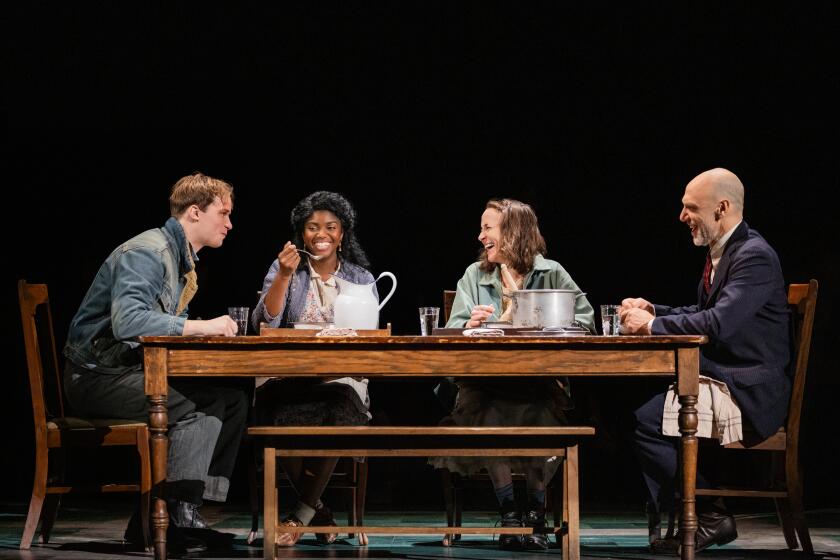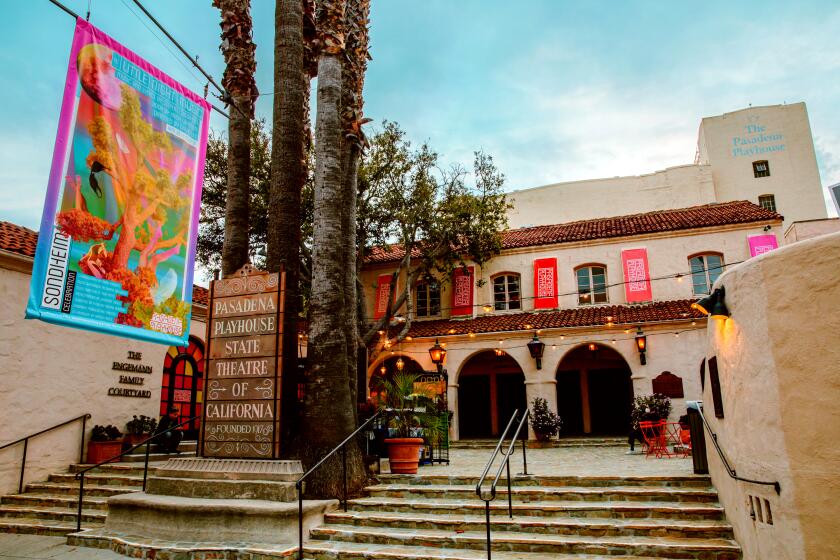Looking Into Her Past--15 Generations Ago : Latino Genealogist to Help Portray a Historic Thanksgiving Event of 1598
Nearly 400 years ago, Pedro Robledo left Mexico with the Juan de Ornate expedition, venturing into what is now New Mexico, to become one of the first settlers in that region. Today, his 13th-great-granddaughter, Pauline Chavez Bent, a genealogist who specializes in Latino history, travels uncharted terrain of a different nature, searching back through time to meticulously piece together her family’s history.
Surrounded by photos of family members, present and past, in her Huntington Beach home, Chavez Bent, 62, carefully unrolled an extensive, wide scroll--a 15-generation pedigree chart. She ran her finger up and down the generations, looking for one name among 1,050. “Here,” she pointed to a name. “This is Pedro. This is my 13th-great-grandfather.”
On April 30, 1598, Robledo and other members of the Ornate group, camped along the banks of the Rio Grande River near what is now El Paso, Tex. After preparing a meal from the fish, geese and ducks found there, they knelt and gave thanks that they had survived their journey.
This little-known historic moment was the first recorded American Thanksgiving, occurring 23 years before the Pilgrims ate their renowned Thanksgiving dinner at Plymouth Rock, Mass.
Today, in the courtyard of Santa Ana’s Bowers Museum, the Hispanic Family History Researchers, an Orange County-based genealogy group, will commemorate the event with a re-enactment called “The First Thanksgiving--1598.” As a member of the genealogical group, Chavez Bent researched the material for the play, which fellow genealogist Mimi Lozano-Holtzman scripted.
The drama is part of the sixth annual Hispanic Family History Seminar, a daylong series of workshops and presentations featuring professional genealogists and a number of exhibits. The Hispanic Family History Researchers, under the auspices of the Mexican-American Arts Council and sponsored by the Bowers Museum, has helped plan the event, Chavez Bent said. “The First Thanksgiving” theatrical presentation, which starts at noon, is free to the public.
Eight performers in the cast, including Chavez Bent, are actual descendants of the original colonizers of New Mexico. Chavez Bent will portray Robledo’s wife, her 13th great-grandmother, Catalina Lopez. “Some people have the idea that just soldiers came to New Mexico, and they married Indian women,” she said. “But that isn’t so. A lot of the men who came with Ornate brought their wives.”
Born in Atarque, N.M., Chavez Bent grew up listening to her family’s verbal history, remembrances passed on to her by her mother, Isabelita Chavez. Although she wrote her first family tree in 1956 after the birth of her first daughter, it wasn’t until 10 years ago that Chavez Bent started to trace her ancestral roots. “I thought I was a hotshot researcher then because I had traced five generations,” she said.
Three years ago Chavez Bent began her serious research.
Since then, she has uncovered 85% of the family history she now has recorded. “But I’ve been lucky,” she emphasized. “The records have been precise.”
For the most part, researching Latino families is easier than tracing Anglo ones, Chavez Bent said. “Most Hispanics were Catholics, so there were baptismal records, marriage records and prenuptial investigations. We’re lucky, in a sense, that our ancestors were Catholics, because they kept very good records.”
Chavez Bent noted with irony that much of her family’s history was recorded because of her more infamous ancestors, one of whom was accused of being a bigamist. “People who weren’t criminals or bigamists, who didn’t get involved in those types of activities, never ended up in any books,” she said.
Since joining the Hispanic Family History Researchers last October, Chavez Bent has pooled her research efforts with other researchers. “Prior to joining the group, most of us were researching in virtual isolation,” she said. “The day after I called to join, I was meeting with a person who is my 10th cousin.”
Formed two years ago by four Orange County residents, the Hispanic Family History Researchers now has a 300-member mailing list. Strictly volunteer, the group shares a “common passion for genealogy,” Chavez Bent said.
In addition to quarterly meetings and special interest workshops, the group conducts its research at the Bolsa Family History Library at the Church of Jesus Christ of Latter-day Saints, Garden Grove Stake in Westminster. There, the group has access to the Mormon Church’s extensive microfilm and microfiche family history data bank.
On Friday afternoons, from 1 to 5 p.m., Lozano-Holtzman and her assistant, Ophelia Marquez, along with other volunteers from the Hispanic Family History Researchers, help fellow Latinos trace their ancestral roots. “We want to reach out to more Hispanics that want to do research, and think they can’t do it,” Chavez Bent said. “We know it can be done because we’ve done it.”
Many of the group’s members specialize in researching specific Latino lines in a variety of Spanish-speaking countries, including Mexico, Spain, Puerto Rico, Cuba, Guatemala, Peru and Colombia.
When Chavez Bent was compiling her family history, her husband Jerry’s aunt sent a complete family genealogy tracing the Bent line back to the American Revolution. Chavez Bent finds it interesting that her three children, Eric Matthew Bent, Roxane Louise Crawford and Denise Margarita Harro, have lineages going back to both the first Anglo and Latino colonizers in America. “Because of their dad, my daughters qualify to become members of the Daughters of the American Revolution,” she said.
Chavez Bent is still trying to fill the missing gaps in her four-century family tree, focusing on completing the first nine generations. She pointed on the 15-generation pedigree chart to an empty space in the fifth generation. “If you can imagine, I have a total blank up here where my great-grandfather is. I don’t know who his parents are.”
It’s possible that information about that ancestor may be sequestered in a church in New Mexico, she said. “Some of the records are still held in individual churches, and they’ve been there since the 1700s. We don’t have any access at this point.
“What I’m afraid of is that someday a really eager-beaver cleaning woman is going to be out there straightening up the rectory, and she’s going to dump the books, and those family members will be lost forever.”
The sixth annual Hispanic Family History Seminar will be held from 8:30 a.m. to 5 p.m. today at the Bowers Museum in Santa Ana. Cost is $17 for advance tickets, $20 at the door. For further information, contact the Bowers Museum at (714) 972-1900.
More to Read
The biggest entertainment stories
Get our big stories about Hollywood, film, television, music, arts, culture and more right in your inbox as soon as they publish.
You may occasionally receive promotional content from the Los Angeles Times.






